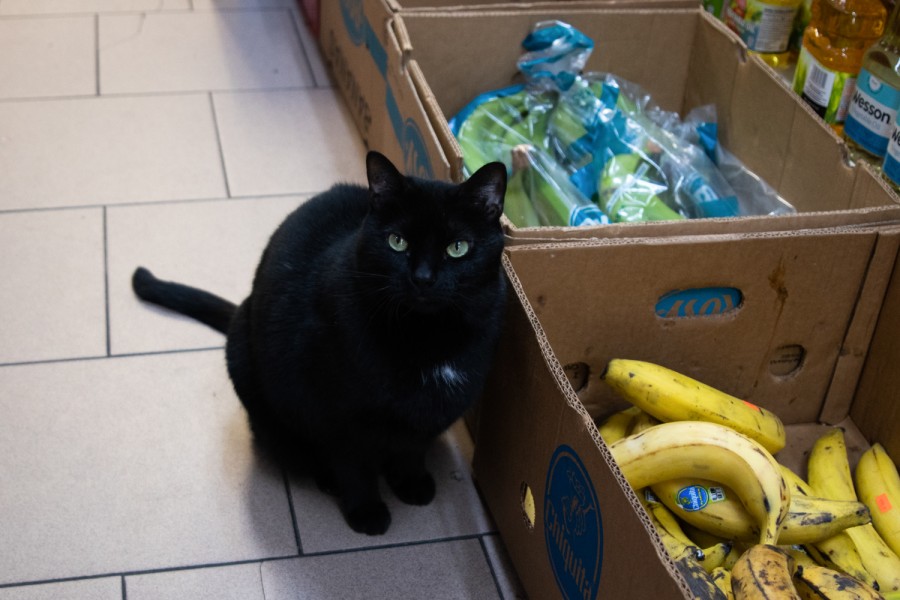Bodega cats: The feline mascots of NYC corner stores
A common sight in local shops, these cats hold a contentious role as community icons — and the primary defense against rodent infestations.
Say hello to Lisa, the bodega cat at 41 Grocery Deli & Grill. (Susan Behrends Valenzuela for WSN)
April 13, 2023
Bodegas have been a staple in New York City for decades. These small convenience stores are known for their wide array of goods, from snacks to household items, and for their lengthy hours of operation. If you’ve ever stepped into a bodega in the city, chances are you’ve encountered a furry feline lounging on the shelves or curled up on the counter. These are the infamous bodega cats, beloved by some and loathed by others. Where did they come from, and why are they such a fixture in these neighborhood shops?
The bodega cat phenomenon has gained widespread attention in recent years, with articles and social media posts showcasing the cats and their unique personalities. The Twitter account @Bodegacats_ posts pictures and videos of bodega cats from around the city, catering to an avid audience of more than one million followers. These cats may not be trained or purchased, but they are often adopted and cared for by store owners who provide food and water, along with a cozy space.
Angel Lopez, an employee at Foster Convenience Store in Flatbush, Brooklyn, said that the allure of the shop’s cat is, at times, more powerful than that of the groceries sold.
“A few customers come just for the cat,” Lopez said. “Sometimes they’re coming to feed her, sometimes they just come and pet her.”
Lopez said his friend brought him two cats — a male and a female — but after six months, the male walked out and never came back. Despite this, Lisa, the female cat, has lived at the store for close to five years. She can often be seen lying around the shop either in boxes or on shelves, sometimes even approaching customers, vying for attention.
Bodega cats have a history of hunting rodents and pests that may contaminate food items in the store — Lopez said that Lisa is particularly good at the task.
Hussein Nassar, the owner of 41 Grocery Deli and Grill in Brownsville, Brooklyn, agrees that cats are beneficial for his business, as customers enjoy his store’s feline worker.
“People used to come in with little dogs and then my cat used to run to the dogs and just stay there with them, play with them, fight them,” Nassar said. “Everybody loves that cat, everybody in the neighborhood.”
He took in his cat Emano in 2019 after housing a familiar neighborhood female cat and her litter, which he found on the street.
“I saw her babies around the corner from the deli from my shop, so I took all the cats in. I guess she don’t like staying in so she left her babies with me,” Nassar said.
However, Nassar said that there are also some customers who do not appreciate the cat’s presence.
“People that don’t like cats, people allergic to cats that come in the store and — mostly people that are over middle age, over 45, 50 — they complain the most,” Nassar said. “I lost some of the customers that don’t like cats, but because I love that cat so much, I don’t really care about the customers.”
Despite bodega owners’ love of cats, regulations prohibit businesses from keeping pets on the premises, though enforcement of these laws varies. Many have decided that paying the $200 to $350 fine for keeping the cat is better than dealing with a rodent infestation, which can contaminate products — while also incurring a separate penalty of around $300. These inspections and fines can cause significant issues for shops, leading them to hide their cats when they suspect an inspection is imminent.
“We always try to keep a cat — it’s just the inspectors that mess up everything,” Lopez said. “We got to take her out when the inspector’s about to come, we got to find a way to keep her away from the store for a few days.”
Nassar has no regrets about having a cat in his store, and feels that Emano has become an integral part of the shop’s brand. Perhaps it is relationships like these — between bodega cats, bodega owners and customers — that keep the corner store cat phenomenon going.
“The cat makes it easy. You feed the cat, you give it what it needs and then it takes care of whatever else you need to be taken care of,” Lopez said.
Contact Phillip HoSang at [email protected].
























































































































































